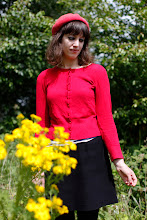 Films, especially documentaries, offer a different way of learning about history. They can take us beyond merely hearing about history being created and offer a peek behind the scenes of an event — we actually get to see history in the making and share in the hopes and fears, experiences and emotions of those creating it. As Bernadette Hyland from the Working Class Movement Library in Salford explained: “This is history told by ordinary people.”
Films, especially documentaries, offer a different way of learning about history. They can take us beyond merely hearing about history being created and offer a peek behind the scenes of an event — we actually get to see history in the making and share in the hopes and fears, experiences and emotions of those creating it. As Bernadette Hyland from the Working Class Movement Library in Salford explained: “This is history told by ordinary people.”In the late 1960s, a student in Oxford piped up during a history workshop and asked why they didn’t study events to do with women. She was told that if she wanted an event, she would have to make it. The young woman was Sheila Rowbotham, now an eminent academic, and she went on to help organise the first National Women’s Liberation Conference at Ruskin College, Oxford in 1970. An event was not only created, but documented, in a twenty minute film called A Women’s Place, which was one of the films screened at the King’s Arms.
The wide-eyed, excited faces of the hundreds of women who descended on Oxford for the National Women’s Liberation Conference shines though the blurriness of the video. We sense the hope and excitement they felt at being surrounded by other women who shared the same concerns as them, as they debate issues about men’s, women’s and children’s liberation — “women are talking again after there‘s been silence for so many years”.
As the narrator of A Woman’s Place admits, though, it’s all very inward looking, and the gathering of educated, eloquent young women contrasts starkly with vox pops of women on the street outside, who are oblivious to the conference taking place and seem unaware that they, as women, face any particular problems. Later on, though, the film shows a march in London "to let the public know who we are and what we stand for". Women, men and children march in support of for the four objectives set out at the conference: equal pay, equal access to education and opportunity, 24 hour childcare and free access to contraception and abortion.
Another film, produced by group of miners’ wives in Derbyshire, demonstrates the power of film to reach out to people across the country at a time when Thatcher used the media to control public opinion of the strikers. The miners’ wives are angry and defiant, filming their experience as a way of showing the hardship faced by ordinary families, as well as the absurdity of the scale of the police reaction to the strikes. A murmur of recognition passes around the crowd watching, decades on, from those who were there and can remember.
By the 1980s, the women’s movement encompassed broader aims, such as solidarity with Northern Ireland, and lesbian and black rights. A film about International Women’s Day is an all singing, all dancing celebration of diverse groups of women coming together.
These films show not only the attitudes of the time, but how far we have come — and how far we have left to go. In a discussion afterwards, one women claimed: “We’re going backwards, people think we’ve won.” But, as members of the recently formed Manchester Feminist Network explain, there are new issues to fight against now — the objectification of women, eco-feminism, female genital mutilation, pornography. The women’s movement is far from being silenced, with women still getting together today to hold events like Reclaim the Night and Million Women Rise — today's events, tomorrow's history.
This review was written for the Mule.
Manchester Film Co-operative does monthly film screenings at the King's Arms, Bloom Street, Salford.





